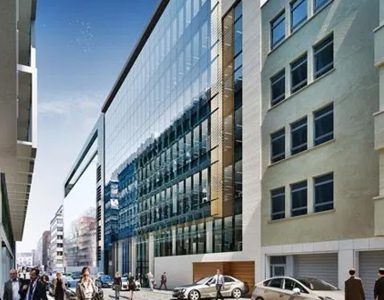The new Horizon 2020 Work Programmes
Horizon 2020 is the biggest European funding programme for research and innovation and has been designed for research institutions, (local) governments, companies and individual researchers. The programme has a budget of € 80 billion until 2020.
In this article Hezelburcht informs you about the themes for the coming years. Reinforcing the existing pillars Excellent Science, Industrial Leadership and Societal Challenges, the most notable newcomer is called the European Innovation Council (EIC). Through the EIC, Horizon 2020 is further emphasising ground-breaking innovations. The components SME Instrument, FET-OPEN, Fast Track to Innovation (FTI) and Horizon Prizes are part of the EIC.
If your (future) project ideas fit into one or more of the themes mentioned below, the Horizon 2020 programme is likely to offer interesting opportunities. Hezelburcht is more than willing to help you explore these opportunities.
Pillar: Excellent Science
The Excellent Science pillar must increase the level of excellent European research and stimulate world-class research to ensure Europe’s long-term competitiveness. The pillar only supports the best ideas and aims to develop talent in Europe, in order to provide researchers with access to research infrastructures and to make Europe an attractive location for the world’s best researchers.
Marie Skłodowska-Curie actions
Marie Skłodowska-Curie actions (MSCA) contributes to excellent research, boosting jobs, growth and investment by equipping researchers with the new knowledge, skills and international and intersectoral exposure to fill the top positions of tomorrow and solve current and future societal challenges. Within the MSCA component, there are five sub-calls:
- Innovative Training Networks (ITN);
- Individual Fellowships (IF);
- Research and Innovation Staff Exchange (RISE);
- Co-funding of regional, national and international programmes (COFUND);
- European Researchers’ Night.
European Research Infrastructures (including eInfrastructures)
Research infrastructures are facilities, resources and services that are used by the research communities to conduct research and foster innovation in their fields. Research infrastructures play an increasing role in the advancement of knowledge and technology and their exploitation. The Research Infrastructures Work Programme 2018-2020 contributes to the implementation of the ESFRI Roadmap. Calls:
- Development and long-term sustainability of new pan-European research infrastructures;
- Interoperability and European open science cloud;
- Integrating and opening research infrastructures of European interest;
- European Data Infrastructure;
- Demonstrating the role of research infrastructures in the translation of open science into open innovation;
- Support to policy and international cooperation.
Pillar: Industrial Leadership
The goal of the pillar Industrial Leadership is to make Europe a successful and attractive location for research, innovation and investments. The calls within this pillar are strongly driven by the industrial agenda of the European Union. This pillar aims to speed up the development of the technologies and innovations that will underpin tomorrow’s businesses and help innovative European SMEs to grow into world-leading companies.
Leadership in Enabling and Industrial Technologies (LEIT)
The Work Programme LEIT supports the development of technologies underpinning innovation across a broad range of sectors. The call has a strong focus on developing European industrial capabilities in Key Enabling Technologies (KETs).
- Information and Communication Technologies. The potential and capabilities of modern ICT systems are still growing exponentially fuelled by the progress in electronics, microsystems, networking, the ability to master increasingly complex cyber-physical systems and robots, the progress in data processing and human machine interfaces. Calls:
- Digitising and Transforming European Industry and Services;
- Cybersecurity;
- Joint Calls: Japan-EU & Korea-EU.
- Nanotechnologies, Advanced Materials, Advanced Manufacturing and Processing and Biotechnology. The Work Programme wants to bridge the gap between nanotechnology research and markets and aims to realise the potential contribution to sustainable growth, competitiveness, environment, highly skilled jobs and increased quality of life. Calls:
- Open Innovation Hubs;
- Materials Characterisation and Computational Modelling;
- Governance, Science-Based Risk Assessment and Regulatory Aspects;
- Factories of the Future;
- Biotechnology
- Medical Technology Innovations ;
- Sustainable Process Industry (SPIRE);
- Catalysing the Circular Economy;
- Clean Energy through Innovative Materials;
- Cultural Heritage;
- Energy-Efficient Buildings (EEB).
- Space. To bring the benefits of space to the European citizens and unleash the potential of space as a vector for growth, competitiveness and jobs creation in the wider European economy, it is necessary to stimulate the integration of space into European society and economy. The Work Programme aims to foster a globally competitive European space sector and ensures European autonomy in accessing and using space in a safe and secure environment. Calls:
- Earth Observation;
- Space Business, Entrepreneurship, Outreach and Education;
- Space Technologies, Science and Exploration;
- Secure and Safe Space Environment
Access to Risk Finance
Access to Risk Finance aims to help companies and other types of organisation engaged in research and innovation to gain easier access, via financial instruments, loans, guarantees, counter-guarantees and hybrid, mezzanine and equity finance.
Pillar: Societal challenges
The purpose of the pillar Societal Challenges is to develop new solutions for social problems that Europe is currently facing. Horizon 2020 addresses social challenges by bridging the gap between research and practice. Ground-breaking solutions are achieved through multidisciplinary partnerships, including social sciences and humanities. Promising solutions are tested, demonstrated and afterwards applied to a large scale.
Health, Demographic change and Wellbeing
The societal challenge ‘Health, demographic change and wellbeing’ aims to deliver solutions for a better health for all. Calls:
- Better Health and Care, Economic Growth and sustainable Health Systems;
- Digital Transformation in Health and Care (e.g. eHealth);
- Trusted Digital Solutions and Cybersecurity in Health and Care.
Food security, sustainable Agriculture and Forestry, Marine and Maritime and Inland Water Research and the Bioeconomy.
This Work Programme extends across a wide array of areas and addresses research questions related to food and production based on land-based, marine and freshwater bio-resources. Calls:
- Sustainable Food Security;
- Blue Growth;
- Rural Renaissance.
Secure, Clean and efficient Energy
The Work Programme supports research, demonstration, innovation and market-uptake actions across different low-carbon energy sectors. Calls:
- Building a low-carbon, climate resilient Future: Secure, clean and efficient Energy;
- Global Leadership in Renewables;
- Smart and Clean Energy for Consumers;
- Smart citizen-centred Energy System;
- Smart Cities and Communities;
- Enabling near-zero CO2 emissions from Fossil fuel power plants and Carbon intensive Industries;
- Joint Actions between Countries;
- Cross-cutting Issues.
Smart, Green and Integrated Transport
The priorities identified in the Work Programme for transport aim to achieve a European transport system that is resilient, resource efficient, climate friendly and safe. For example innovations with regards to alternative fuels (e.g. hydrogen, LNG and electro-mobility) and automated vehicles. Calls:
- Building a low-carbon, Climate resilient Future: Low-carbon and sustainable Transport;
- Safe, integrated and resilient Transport Systems;
- Global Leadership and Competitiveness;
- Accounting for the People.
Climate action, Environment, Resource Efficiency and Raw Materials
The Work Programme focuses on moving to a greener, more resource efficient and climate-resilient economy in sync with the natural environment, demonstrating a strong commitment to supporting the UN’s Sustainable Development Goals (SDGs) and the targets of the Paris Agreement. For example innovations concerning the themes climate adaptation, circular economy and climate resilient cities. Calls:
- Building a low-carbon, Climate resilient Future: Climate action in support of the Paris agreement;
- Greening the Economy in line with the Sustainable Development Goals (SDG’s).
Europe in a Changing World – Inclusive, innovative and reflective Societies
The specific objective of the Work Programme is to foster a greater understanding of Europe, provide solutions, and support inclusive, innovative and reflective European societies in a context of unprecedented transformations and growing global interdependencies. Themes covered by this call include prevention of radicalisation, social and economic effects of migration and innovation in public services. Calls:
- Migration;
- Socioeconomic and Cultural Transformations of the fourth Industrial Revolution;
- Governance for the Future.
Secure Societies – Protecting Freedom and Security of Europe and its Citizens
The societal challenge ‘Secure societies’ focusses on ensuring a high level of security for Europeans. The Work Programme covers themes regarding protection against terrorism and technologies to enhance the security of citizens. Calls:
- Protecting the Infrastructure in Europe;
- Security;
- Disaster-Resilient Societies;
- Fight Against Crime and Terrorism;
- Border and External Security;
- Digital Security.

European Innovation Council
SME Instrument
The focus within the SME Instrument component is on close-to-market and scale-up projects of a single SME or a consortium of SMEs established in European Member States or Horizon 2020 associated countries. The SME Instrument is for innovators with ground-breaking concepts that could shape new markets or disrupt existing ones in Europe and the world. The SME Instrument has a phased approach:
- Phase 1 | Feasibility study;
- Phase 2 | From concept to market;
- Phase 3 | Commercialisation.
Fast Track to Innovation (FTI)
For industry-driven consortia that seek a quick market uptake of new solutions and bring together actors with complementary backgrounds, knowledge and skills.
Future and Emerging Technologies (FET-Open)
FET-Open aims to establish European leadership in the early exploration of future technologies. It looks for opportunities of long-term benefit for citizens, the economy and society. Besides, it aims to mobilise Europe’s most creative and forward thinking researchers from all disciplines to work together and explore what may become the leading technology paradigms of the future. Calls:
- FET-Open Challenging Current Thinking;
- FET-Open Coordination and Support Actions;
- FET Innovation Launchpad.
Horizon Prizes
The EIC boosts breakthrough innovation by fostering innovative solutions for societal challenges. The prizes aim to boost pioneer innovations across sectors by stimulating various cutting-edge solutions to challenges which bring major benefits to citizens and society. The EIC awards projects with Horizon Prizes for:
- Innovative Batteries for eVehicles;
- Fuel from the Sun: Artificial Photosynthesis;
- Early Warning for Epidemics;
- Blockchains for Social Good;
- Low-Cost Space Launch;
- Affordable High-Tech for Humanitarian Aid.




